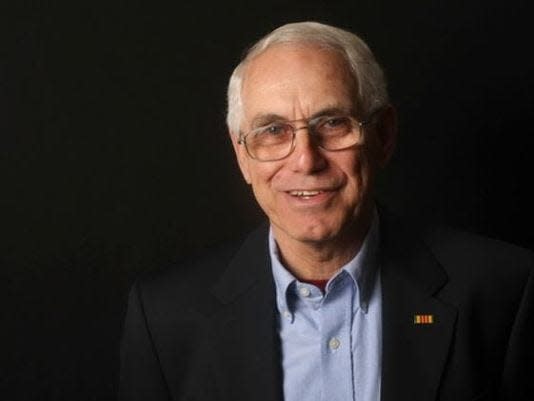What would Professor Jesus do?
- Oops!Something went wrong.Please try again later.
There’s a new sheriff in town! Actually, he’s not a sheriff. I’ve just always wanted to use that line. And I’m referring not to your town, but to the one I’ve been rusticated to — Lynchburg, Virginia — home of Liberty University. It now has a new president. His name is Dondi Costin, and while he has never been a sheriff, he has been an officer. Costin is a retired Air Force major general who headed up that service’s chaplain corps.
Liberty is the name of the small Christian college the evangelist Jerry Falwell begot in 1971. It has since grown into an evangelical academic powerhouse boasting an on-campus enrollment of over 15,000 students and an online enrollment of 115,000.
Following Falwell’s death in 2007, his eldest son, Jerry Jr., took over as president — by right of primogeniture, I presume. Falwell Junior’s fall from grace in 2020 was the stuff of both national and tabloid news. As I’ve reported in the past, administrators, faculty, students, and staff members at Liberty are all expected to accept the school’s fundamentalist doctrinal statement and to adhere to its strict standards of conduct. (“Liberty University Confidential,” Oct. 16, 2016) To say the least, Falwell and his wife were not practicing what Liberty preaches.

Costin has given interviews to local media, and thus far, he has impressed me as more personable and open than his predecessor. I would, however, like to pose a question about his Air Force background. He graduated from the Air Force Academy in 1986. Readers may recall that the Air Force Academy made national news in 2005 for allegedly pressuring cadets to become evangelical Christians and for discriminating against non-Christians. I have to wonder if such an atmosphere prevailed when Costin was a cadet, and if so, how he feels about it.
I likewise wonder about something Costin said in an interview posted on Liberty’s website: “Liberty will remain a place where students can safely ask questions about God.” How far might that extend? The doctrinal statement I mentioned above holds the Bible to be “inerrant in the originals and authoritative in all matters.” It affirms that God created the universe in six historical days? What if an LU student were to question that?
And I’ve been especially intrigued by something Costin said in an interview with a local TV station — that Christ’s spirit should be present in every class at Liberty. “It should be as if Jesus [were] a faculty member,” he added. “How would he teach the class?” That got me thinking.
Just how then would Jesus teach at a university like LU? There is no tenure there, and as some evangelicals have begun to complain, Jesus was pretty “woke.” Would his teachings about tolerance, forgiveness, and charity be well-received at today’s Liberty? Before the right wing weaponized the term, “woke” signified the Christian virtues of empathy, sympathy and sensitivity as well as a concern for social justice. And Jesus was all about the downtrodden, was he not?
The Jesus I learned about was also high on brotherhood and inclusion. He even dined with publicans and sinners. How do I know? The “inerrant” Bible tells me so. He would weep at the political tribalism dividing us now — not just in our nation at large but also at LU. Recent student convocation speakers have included Nikki Haley, Mike Pence, and Ron DeSanstis. Democratic politicians are persona non grata. That’s because Liberty University doubles as a Republican Political Action Committee.
How then would LU Prof. Jesus fare if he were to (1) recommend inviting Democrats and Republicans to meet on campus to work together for the common good, or (2) remind the administration that a non-profit university should not involve itself in partisan politics?
Finally, what if Jesus were hired to teach English literature? He might introduce students to a non-doctrinal, close reading of Milton’s "Paradise Lost." Milton believed the reality of God surpasses human understanding and that the Bible is not to be taken literally. Rather, he held scripture to consist of a series of divinely sanctioned metaphors and stories accommodated to our limited human understanding.
Moreover, in "Paradise Lost," Milton — pardon the pun — fleshes out the Adam and Even story, giving both characters relatable human frailties, motivations, and desires LU students could relate to. And he gives the devil his due — so much so that readers are initially taken in by Satan’s rhetoric. Milton puts faith on an intellectual footing, and that could prove challenging for students hemmed in by institutional doctrine and dogma.
Personally, I could see Jesus telling his LU students we have been given the light of reason to question and to think for ourselves. Could he say that at university that rejects the theory of evolution and which holds the world to be only 6,000 years old? Sad to say, but I could then see Jesus having to teach at another kind of university — a liberal one.
So why should people living on the other side of the country care about what’s happening at Liberty University? Kevin Roose — a former Brown University student who spent a semester at Liberty — put it best in his book about that experience, “The Unholiest Disciple”: “These people vote.” And, in my experience, they generally side with former VP Pence, who believes the Constitution does not guarantee freedom from religion.
Anyone out there up for a little theocracy? I’m not!
Contact Ed Palm at majorpalm@gmail.com.
This article originally appeared on Kitsap Sun: What would Professor Jesus do?
